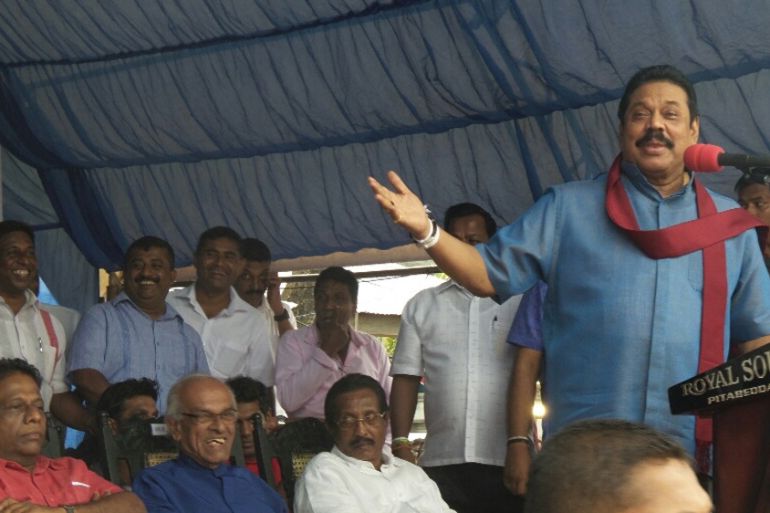Will Rajapaksa make a political comeback in Sri Lanka?
The former president will contest Monday’s poll for a seat in Sri Lanka’s parliament.

Colombo, Sri Lanka – Claiming to be a “reluctant returnee” to mainstream politics after his defeat in the January polls, former Sri Lankan President Mahinda Rajapaksa confidently maintains not only is he a strong opponent but also the man who will defeat the incumbent government.
The January 8 presidential election saw Rajapaksa unexpectedly defeated by Maithripala Sirisena who was the secretary of Rajapaksa’s own Sri Lanka Freedom Party (SLFP) until his defection.
Keep reading
list of 4 itemsNorth Macedonia votes in presidential polls as EU membership bid looms
Cost of doing business with Iran? US warns Pakistan of sanctions risk
Protesters demand Israeli PM’s resignation
Many thought that Rajapaksa, known for his aggressive politics and Sinhala nationalistic tendencies, was consigned to political history after he was unseated by his uncharismatic former secretary and health minister.

But his return ahead of the country’s August 17 general elections, has surprised many and has shaken the incumbency’s sense of comfort.
A strong “Bring Back Mahinda” campaign has risen from within the United People’s Freedom Alliance’s (UPFA) coalition – a multihued political alliance to ensure Rajapaksa’s comeback.
Rajapaksa claims, however, that he was happy to hang his boots and enjoy retirement in his ancestral hometown in the island’s deep south.
“I re-entered politics due to popular demand by our party ranks,” he recently told the media in the capital Colombo.
Currently, Rajapaksa is the front man of the UPFA’s election campaign and is making a strong parliamentary bid by promising “to overthrow this weak and corrupt government”.
“We will win over 120 seats in parliament,” he told Al Jazeera with conviction after a recent party meeting.
“This is nothing but a chaotic and corrupt coalition of unlikely partners. They will spell ruin for our motherland and will eventually divide the country on ethnic lines,” he has said repeatedly at campaign meetings, stoking the fears of separatism to a population still carrying strong memories of a protracted 26-year-long civil war.
“In seven months, this government has reversed everything we achieved. The economy is in shambles, developmental activities have been stalled and national security is being undermined,” Rajapaksa told a packed audience in Colombo, the island’s political heartland.
Controversial record
Rajapaksa, a one-time human rights campaigner turned politician from Hambantota, in the island’s deep south, is known for his ability to mobilise the masses.
Both his father and uncle represented the same electorate before him.
Rajapaksa declared war against the Tamil Tigers in 2006 and militarily defeated them in May 2009. For many Sri Lankans, he is a hero and to others, a man who has committed war crimes.
The offensive that he led against the Tamil Tigers brought him international condemnation as a president who did not hesitate to bomb his own citizens.
![Supporters at a rally in Akuressa, Matara in Sri Lanka's south [Dilrukshi Handunnetti/Al Jazeera]](/wp-content/uploads/2015/08/b107669ccf71483cbd6ce1291cbbb9be_18.jpeg)
The United Nations has estimated over 40,000 civilian deaths during the final phase of the war in the north, which concluded on May 16, 2009. A UN human rights report into the alleged war crimes is due out in September.
Since his January defeat, Rajapaksa has faced accusations of large-scale corruption, abuse of power and nepotism during his time in power.
Members of his immediate and extended family are facing several ongoing corruption probes.
Meanwhile, Rajapaksa has become the key target of the government’s election campaign.
The former head of state has told Al Jazeera that their aim has been to tarnish his image, bring disrepute to his family, in particular his children.
RELATED: Sri Lanka’s former leader Rajapaksa remains defiant
Political cover
“I am called many things by my detractors. All I can say is: Dictators don’t hold regular elections and leave office, when defeated. That’s exactly what I did,” Rajapaksa told the Sunday Observer, a popular Sri Lankan news weekly.
As for allegations of corruption, Rajapaksa has a ready-made response.
The Sunday Observer reported him as saying: “So many investigations but they have not found a needle I have misappropriated. They claimed of an expensive banquet I am supposed to have hosted but that’s the banquet hosted for the Commonwealth Heads of State. I am not affected by any of these allegations.”
Nevertheless, it is not so easy to brush aside the many allegations that make a section of the island’s population view his re-entry with suspicion.
Ajith Perera, the deputy minister of foreign affairs and a Rajapaksa critic, told Al Jazeera that his return is a desperate attempt to get “some kind of a political foothold to avoid serious consequences for his past actions”.
This is a view shared by Sujeewa Senasingle, the deputy minister of justice.
“People voted [for] the new government to end corruption and family rule,” he told Al Jazeera.
“It was a mandate given to end impunity and to create a Sri Lankan nation. There are many ongoing investigations that involve several members of the Rajapaksa family while other inquiries are still to commence,” Senasingle said.
“Mahinda Rajapaksa needs some kind of protection. Becoming a parliamentarian will offer some cover,” said the deputy minister.
Meanwhile, Rajapaksa has been travelling across the island as part of his aggressive political campaign, calling for the unification of all forces to defeat the current government to “create a strong single party-led administration”.
Under the slogan “Let’s power the nation: Let’s start afresh,” he promises stability and the absence of terrorism, more development initiatives and to fight “Western conspiracies that undermine the sovereignty of small nations”.
|
|
| Ex-Sri Lankan president eyes political comeback |
Strategic new electorate
Analysts are quick to point out that Rajapaksa has strategically shifted to a highly populous new electorate – Kurunegala. It is located in the northwestern province, a Sinhala dominant constituency, in the majority Sinhalese island nation of 20 million, with the highest percentage of military families.
“He has always presented himself as the president of the majority Sinhalese,” Gamini Viyangoda, a political activist, academic and columnist told Al Jazeera.
“The voting on January 8 clearly demonstrated that President Rajapaksa was not everyone’s president but the president of some. In practice, he excludes ethnic minorities,” Viyangoda said.
His supporters, like the general secretary of the UPFA, Susil Premajayantha, say there’s a “Mahinda phobia” among government members.
The former cabinet minister said that the government has strived to divide the UPFA’s main constituent party, the SLFP, into two. “It is Rajapaksa who unified the splintered party,” Premajayantha said.
Opinion polls have indicated that the incumbency will romp home with a simple majority, effectively quelling the chances of Rajapaksa becoming the island’s next prime minister.
Still, Rajapaksa is not yet a political write-off.
The former president who evokes strong emotions in the Sri Lankan people – be it deep devotion or strong dislike – remains, for now, a formidable political personality in the country and in the region.